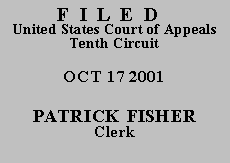

| ROBERT D. KAUTZ,
Petitioner-Appellant, |
|
| v. | |
| TONY REID, Warden, and
ATTORNEY GENERAL OF THE
STATE OF COLORADO,
Respondents-Appellees . |
Robert Kautz, a state prisoner proceeding pro se, requests a certificate of appealability ("COA") to appeal the denial of his 28 U.S.C. § 2254 petition for a writ of habeas corpus. He also renews on appeal his motion to proceed in forma pauperis pursuant to Fed. R. App. P. 24(a)(5). For the reasons stated below, we deny a COA, deny the request to proceed in forma pauperis, and dismiss the appeal.
In early 1988, Mr. Kautz was convicted of first degree assault and was sentenced to thirty-two years' imprisonment. He did not file a direct appeal. After being denied post-conviction relief by the state district court, Mr. Kautz appealed to the Colorado Court of Appeals and Colorado Supreme Court. His petition was denied on appeal by both courts.
On February 21, 2001, Mr. Kautz filed the present petition for federal habeas relief pursuant to 28 U.S.C. § 2254. His petition asserts that his due process and equal protection rights and right to be free of illegal search and seizure were violated. He alleges this violation occurred because the statutes under which he was convicted were published in the Colorado Revised Statutes without an enacting clause as required by Article V, Section 18 of the Colorado Constitution.
The federal district court, in a well-reasoned order, found that Mr. Kautz's argument is without merit. The court determined that the statutes he was convicted of violating appear with the required enacting clause in the Colorado Sessions Laws, and Mr. Kautz does not dispute this fact. Mr. Kautz's contention that the Colorado Revised Statutes are the only valid published source of law in Colorado has no legal basis because the Sessions Laws satisfy the enacting clause requirement of the Colorado Constitution. See People v. Washington, 969 P.2d 788, 790 (Colo. Ct. App. 1999) ("The Colorado Revised Statutes are the official compilation of the Session Laws of Colorado, the latter containing the official publication of the enactments of the General Assembly."). For these reasons, the district court denied relief on April 19, 2001 and subsequently denied Mr. Kautz a COA.
Because he is proceeding pro se, we construe Mr. Kautz's allegations liberally. See Haines v. Kerner, 404 U.S. 519, 520-21 (1972) (per curiam). To be entitled to a COA, Mr. Kautz must make a "substantial showing of the denial of a constitutional right." 28 U.S.C. § 2253(c)(2). He may make this showing by demonstrating that the issues he raises are debatable among jurists, that a court could resolve the issues differently, or that the questions presented deserve further proceedings. See Slack v. McDaniel, 529 U.S. 473, 483-84 (2000).
Mr. Kautz's argument on appeal primarily contends that the Colorado Court of Appeals was incorrect in its reasoning and outcome in Washington and therefore that the issues he raises could be resolved differently or are otherwise debatable among jurists. Nothing in the record on appeal explains why this would be the case, and the reasoning in Washington is sound. Even construing his allegations liberally, this court must find that Mr. Kautz has not met his burden of showing the denial of a constitutional right. We therefore conclude that he is not entitled to federal habeas relief, and his request for a COA is denied.
Next, we turn to Mr. Kautz's request to proceed on appeal in forma pauperis. In order to succeed on his motion to proceed in forma pauperis pursuant to 28 U.S.C. § 1915(a), Mr. Kautz "must show a financial inability to pay the required filing fees and the existence of a reasoned, nonfrivolous argument on the law and facts in support of the issues raised on appeal." DeBardeleben v. Quinlan, 937 F.2d 502, 505 (10th Cir. 1991). As already discussed, Mr. Kautz presents no legal basis for refuting the holding in Washington. In the absence of any legal reasoning to support his contentions, it is difficult to characterize Mr. Kautz's petition as anything other than frivolous. For that reason, Mr. Kautz's request to proceed in forma pauperis is denied.
Accordingly, we DENY Mr. Kautz's motion for a COA, DENY his renewed motion to proceed in forma pauperis, and DISMISS his appeal for substantially the same reasons as the district court.
Entered for the Court,
Robert H. Henry
Circuit Judge
*. This order and judgment is not binding precedent, except under the doctrines of law of the case, res judicata, and collateral estoppel. The court generally disfavors the citation of orders and judgments; nevertheless, an order and judgment may be cited under the terms and conditions of 10th Cir. R. 36.3.